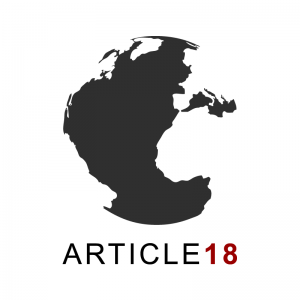By Martin Surridge – Just a few weeks ago, I returned from one of the most beautiful and enchanting countries in Southeast Asia-Thailand-a country known for its love of soccer, its patriotic fervor, sandy beaches, and the rapidly developing, international city of Bangkok. But there’s much more to Thailand than the capital. In fact, much of the nation’s beauty lies in its mountainous northern provinces, where rural hill tribes from neighboring Burma and Laos settled over the past few centuries and brought with them their tribal customs and languages.
This is Article18-RLTV’s weekly blog specifically dedicated to religious liberty issues in other countries around the world. Each week, we focus on a different nation, and the struggles facing one of its religious communities. This week, for our second entry on Thailand, Bob Young from the Thailand branch of the Adventist Development and Relief Agency (ADRA) explains some of the challenges facing these tribal groups, many of whom lack even the most basic sanitation and water needs, and the challenges facing Christianity in Thailand today.
It could be easy to assume, as I did during my stay in the Christian hill-tribe village of Pang Kwai, that the underdevelopment seen in many of these small Christian communities could be linked to their status as minority religious groups in a majority Buddhist country. However, that is not typically the case.
“The underdevelopment of the villages in Chiang Rai is more an ethnic issue than religious,” said Young, a Christian, who does PR and marketing for ADRA Thailand.
“In much the same way as western colonies treated the indigenous peoples as they were being settled, the Thais have treated the indigenous minority ethnic peoples of Thailand. This problem would still be in place even if these villages were Buddhist. There are majority Buddhist villages which suffer the same underdevelopment as the Christian villages of the same ethnic group, or as in the case of the Hmong, non-Christian religion.”
ADRA Thailand, with the help of volunteers from the United States, has been working hard to help provide these communities with cleaner drinking water, electricity improvements provided by the Westline Electrical team, and adequate sanitation. While I was there last month, working with Bob Young and other ADRA employees, our group helped villagers to dig a 2 kilometer trench for a pipe to bring spring water into the village. It was an emotional race against time as the village’s hastily-rigged temporary water solution completely failed during our second day there. The river water we bathed and washed our clothes in was unsafe to drink and purchasing bottled water in town was an expensive, inconvenient option. So when the water finally came pouring into the village reservoirs on our last day there, the sense of relief was palpable, and utterly moving to us foreigners who take such things as running water for granted.
It affirmed my belief that ADRA and other aid organizations, religious or non-religious, are truly making a difference in the lives of these people. But as a Christian organization in a non-Christian country like Thailand, relationships between the government and relief workers is not always smooth.
“Since the Thai constitution guarantees freedom of religion, there is no public persecution of Christians anywhere in Thailand. [But] approximately two years ago, the Buddhist diocese approached the government to make Buddhism the [official] religion of Thailand,” Young explained.
“Their reasoning may be purely logical and benevolent but it has raised a lot of fear amongst the faithful of Thailand who believe this is a first step to Christian persecution.”
While he had few complaints about the difficulties that ADRA has in Thailand, Young explained that just like many other NGOs in the region, “government bureaucracy, adequate funding, adequate manning of appropriately trained people, and trust from the beneficiaries” are some of their most pressing challenges. Young pointed out however, that in Thailand, Christianity as a whole faces other problems, though fewer than many other non-Christian countries around the world.
“Christianity’s greatest challenge in Thailand is in competing with a religion that is very desirable,” he said. “The sin issue can be dealt with through works and there is no need to give up everything in life to someone who cannot be seen. Even if Christianity was readily accepted, it would still have a hard time competing with Buddhism. Thai society considers Christianity to be the religion of the foreigners – not Thais.”
Thailand quickly became close to my heart after only being there for a couple of weeks. It was hard to imagine how tough it must be without water, without proper sanitation. I don’t make a practice of asking people to donate to certain causes but if you’re looking for a way to share a small portion of what you’ve been given with those who have far, far less, please visit ADRA Thailand’s donation page today. Thank you.
Article18 is a weekly blog written by Martin Surridge, Associate Editor of Religious Liberty TV. Article18 logo and artwork created by Bradley Kenyon.